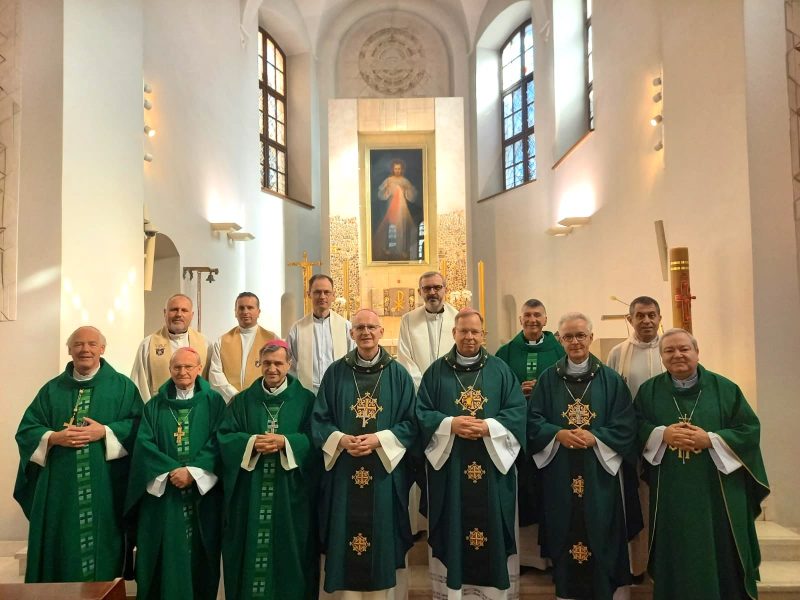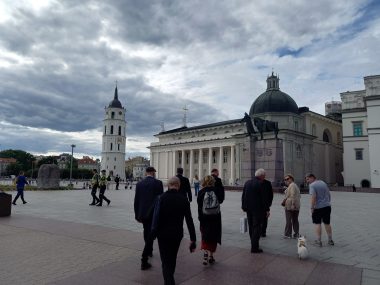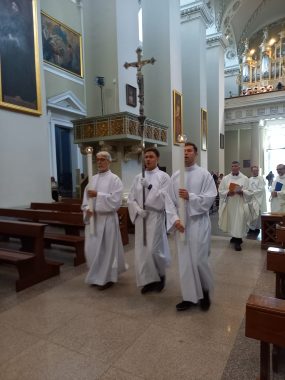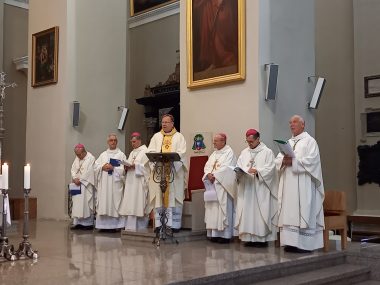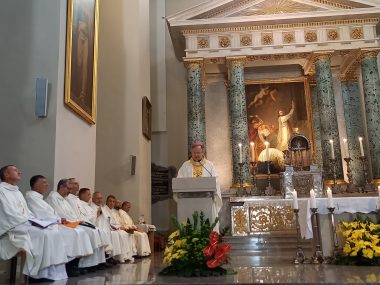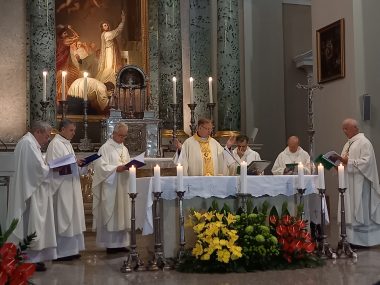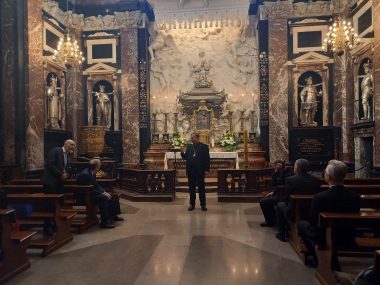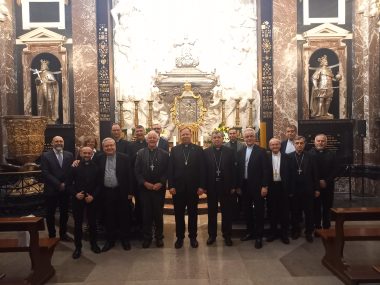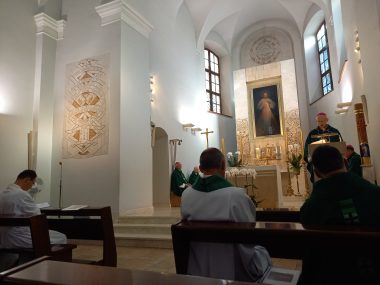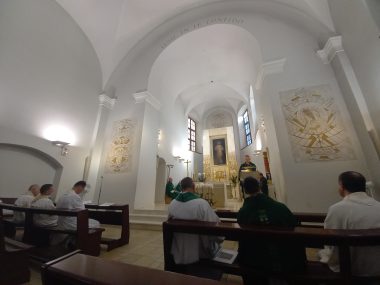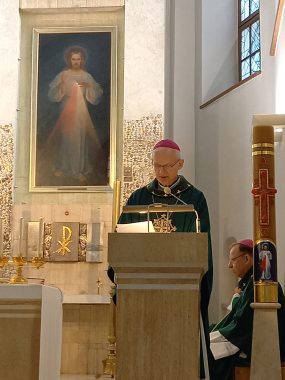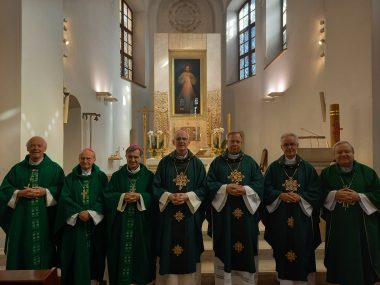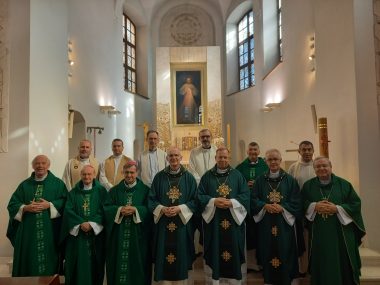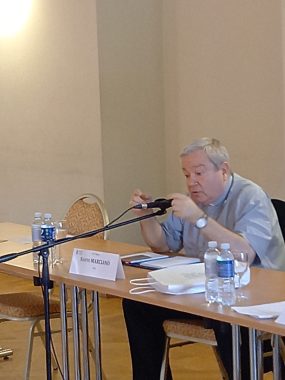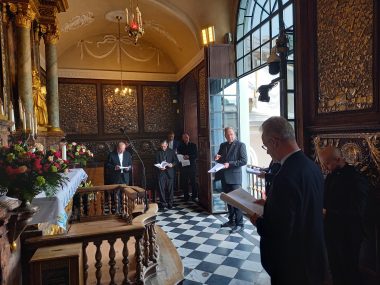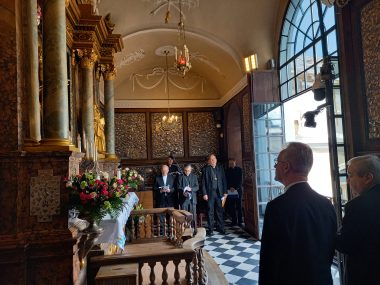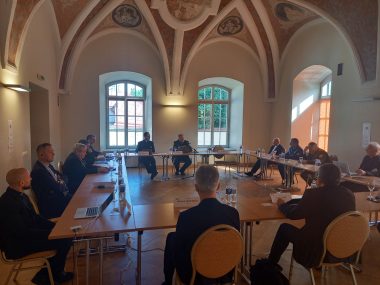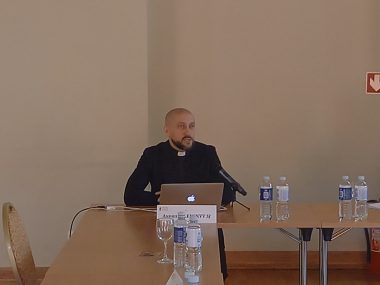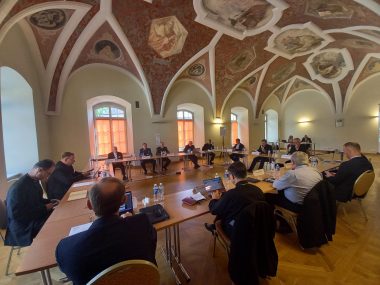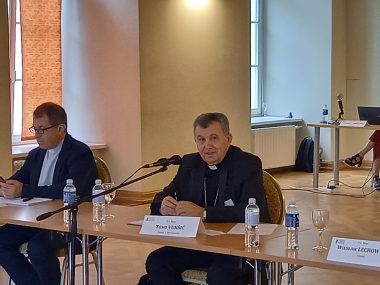On the occasion of the NATO summit, the meeting of the Military Ordinaries of the European Bishops’ Conferences also took place in Vilnius. This was an occasion to reflect together on the pastoral care of military personnel and their families, with a fraternal exchange on experiences and decisions in the current European scenario, particularly in the context of the war in Ukraine.
Welcoming the military bishops was the Archbishop of Vilnius Gintaras Grušas, CCEE President and also Military Ordinary for Lithuania. In his introduction to the proceedings, Grušas recalled that this Vilnius meeting is the first one of the military ordinaries organised by the CCEE, and that it will take place every two years, to deal with pastoral issues related to the military world.
After outlining the European experience at the Continental Assembly of the Synod in Prague, and presenting the CCEE’s scheduled initiatives, Archbishop Grušas dwelled on the Armed Forces pilgrimage to Lourdes, which every year sees thousands of young soldiers arrive at the Marian shrine to invoke the Blessed Virgin Mary’s protection and to pray for peace. And he concluded: “we want to accompany this summit of heads of State, members of NATO, with the prayer that their choices will be oriented towards the common good, that they will work for human promotion, and that they will work to put an end to conflicts and to guarantee peace”.
In his address, Fr Andrij Zelenskyy SJ, chief of the Ukrainian chaplains, presented the development of the role of chaplains during the war. In a conflict situation, such as the one Ukraine is facing, starting in 2014 and especially with the Russian invasion in 2022, one witnesses – the Jesuit chaplain declared – situations of aggression of entire communities of civilians, acts of violence, even on women and children, leading to the radical destruction of space and time; the limit of humanity is crossed; a real ontological collapse is reached.
In this context, the chaplain’s role is to be present in the field by accompanying soldiers for spiritual care, with the administration of the Sacraments even in the trenches, with prayer in small groups, with support and proximity.
It is a service that is part of a broader framework, of continuing education, to counter the disorder generated by war with the search for the order from which peace can arise, with the commitment of all to seek truth, choose the good, fight for justice, and contemplate beauty.
The Archbishop of Sarajevo and Military Ordinary of Bosnia and Herzegovina, Tomo Vukšić, outlined the service of chaplains in post-conflict areas and situations, starting from their experience in the war in former Yugoslavia, in a multi-ethnic, multi-religious and multi-cultural context. “Their contribution, however, cannot be separated from the rest of the Church, of which they are part, nor from the concrete legal, political, cultural, economic and religious situation of the society in which they live and of the army to which they are sent for spiritual care”.
A very important pastoral theme in areas where a conflict has ceased is that of the spiritual accompaniment of military personnel and veterans, who have direct and often many years’ experience of war, or of persons who have been deprived of their freedom for a period of time for reasons relating to armed conflicts.
“In Bosnia and Herzegovina, – continued the Archbishop of Sarajevo – in terms of material reconstruction, quite a lot of progress has been made over the past 30 years, but much remains to be done in the material sense and above all at the level of healing psychological wounds and deep traumas. Therefore, the creation of legal, social, political, cultural, religious and economic prerequisites for the construction of a just and lasting peace, based on dialogue and full respect for the rights of individuals and the three constituent peoples, emerges as an absolute priority. And in order to achieve this, concrete cooperation is required between all members of society, including religious ones, and including military chaplains and ministers of other churches and religions”.
“In spite of the difficulties, the Catholic Church in Bosnia and Herzegovina – Archbishop Vukšić added – is convinced that sincere interreligious, social, political and cultural dialogue would help the establishment of social harmony and the promotion of the common good, to heal the wounds of the troubled past and to strengthen the consciousness and vocation of religious communities to be a moral reference point. Indeed, precisely because the difficulties are there, dialogue is necessary”.
Finally, the Military Ordinary for Italy, Archbishop Santo Marcianò, addressed the issue of pastoral care in the military world between challenges and opportunities.
“When we speak of the Church Ordinariate and pastoral challenges, we speak of evangelisation. That is where the pastoral challenges come from, and indeed all the challenges that reach us as a Church”, said the Italian Military Ordinary.
“First and foremost, we are the Church, it should always be emphasised; a particular Church specifically instituted for human and spiritual assistance to the Armed Forces and that over time has gone – as John Paul II explained incisively at the conclusion of the first Synod of the Military Ordinariate Church in Italy – “from a ‘Church service’ offered to the military to a ‘Church of service’, gathered among those in the military world who are called to exercise their baptismal priesthood, working for peaceful coexistence among men””.
For Christians – Marcianò continued – military commitment is a service, a true ‘ministry’, which requires heroism and the courage of peace. “And I believe this is where the heart of our task lies, aided by the values that the military world brings with it: being aware that the military are not just people to whom we offer a service, but rather a family, a community, a portion of the Church ‘at the service’ of the world”.
In this context, and within the synodal horizon to which the entire Church is called, Marcianò identifies some opportunities for pastoral care in the military world that are valid for all:
The richness of youth and education. “The Military Ordinariate Church, a “younger” Church because it is richer in young people, is therefore called upon to make the most of this extraordinary gift that it has, which is also a great responsibility, by devising special initiatives to be proposed to young military personnel; by trying to intercept the demand for meaning of the young people in our barracks”.
Ecumenical outlook and Interreligious Dialogue. “The military world, especially in certain countries and in Missions conducted under the aegis of international organisations, experiences the ‘ecumenism of works’ that the most recent Popes have repeatedly indicated, with the Magisterium and concrete gestures”.
Migration and welcoming. “The commitment of the military in various international peace-support missions, where they help refugees in the area of prevention and human advancement, makes us appreciate not only the competence of our Italian Armed Forces, but also the ethics that characterises them and sees them attentive to the values of justice and the common good, fraternity and peace: values that are only possible if, at the basis of everything, we place the defence of every human person at every stage and condition of life and the care of their inalienable dignity”.
Praying for peace. “If it is true that the military are a service of peace, if it is true that peace is at the heart of the Church, it is true that the Military Ordinariate is called to ceaseless prayer for peace”.
Pastoral care of the environment and spiritual accompaniment. “The military chaplain’s service is truly aimed at everyone, not just believers, and has the peculiarity of that sharing of life which makes pastoral service itself more concrete and targeted. And this makes us an authentic expression of the ‘outgoing’ Church, dreamed of by Pope Francis, with an ‘environmental pastoral care’ that cannot be adequately covered by parishes, and which is not to be invented but to be valued. Ours can perhaps be an example for other sectors, particularly in large cities where most of people’s lives are spent in places of study and work. A pastoral care which, if we think about it, also makes a synodal style more concrete”.
Many moments of prayer accompanied the meeting: in the chapel of the Gates of Dawn, as well as in Vilnius Cathedral as well as in the Shrine of Divine Mercy. During the meeting the Bishops and representatives of the Military Ordinariates of Europe prayed in a special way for the peace in Ukraine.

